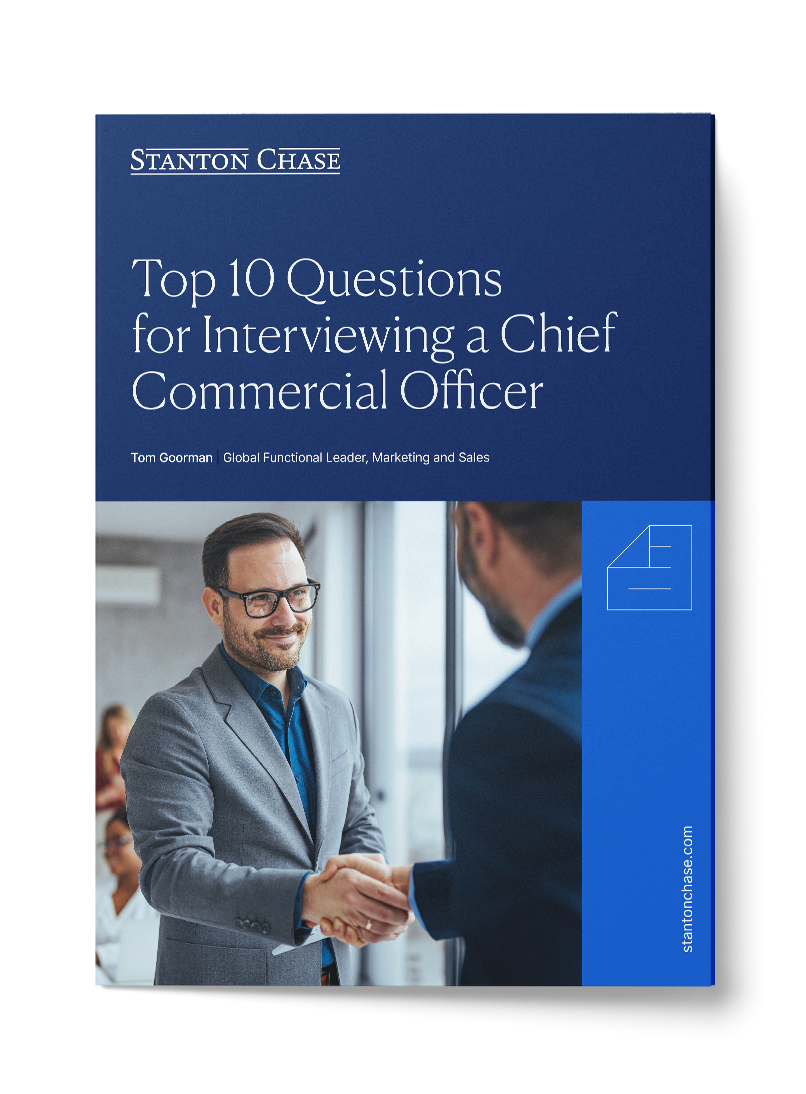
Dear reader,
The job of Chief Commercial Officers (CCOs) is becoming more and more important. They provide essential guidance for businesses. Let’s break down what these versatile leaders do in simple terms:

Still unsure about what CCOs do? Our informal LinkedIn poll says 26% of people are. A CCO is the link between the CEO and customers’ needs and experiences. They inform the C-suite about what needs to be done to ensure that your sales numbers keep rising and don’t plateau.
You might think, “Isn’t this what all executives are meant to do?” But here’s something to chew on: today’s consumers are different, and thus, C-suites need to be different too. Consumers expect more. They’ve carved out a niche for CCOs that didn’t exist 40 years ago.
The challenge then becomes picking the right CCO. Their impact can range from sparking new business opportunities to completely missing the target. You don’t want the latter.
That’s why I’ve put together this guide—especially for CEOs like you. Choosing a CCO isn’t just business as usual. So, I’m sharing 10 top questions for your CCO interviews, to help you find the champion your business needs.
Yours truly,
Tom Goorman, Global Functional Leader, Marketing and Sales
5 Questions on Soft Skills for Chief Commercial Officers
When looking for a CCO, think ahead. You’re not just picking a leader for today; you’re choosing one for the future—2040 and beyond. Here’s why:
By 2040, we expect a massive shift online, with 95% of sales happening there. Most brick-and-mortar stores will likely have gone the way of the dinosaurs. The Asia Pacific region is set to boom, making up 39% of the world’s spending power. That means businesses need to start building their presence in emerging markets now. And while our planet’s population will grow by one billion, the number of consumers will jump by two billion. Generation Alpha, the children of today, will be the shoppers of 2040 with totally new desires—things will be all about speed, efficiency, affordability, and technology yet to be invented.
So, to get to the point, you need a CCO who’s built to last. Someone who can plant strong roots now. But what should you look for in a future-ready CCO?
Here’s what counts:
1. Critical Thinking
Critical thinking means disciplined, clear, and rational thinking. It’s driven by evidence and self-awareness. Critical thinkers ask questions, analyze assumptions, and apply thought to make good decisions and sound judgments.
Everyone likes to think they’re a critical thinker. In fact, 67% of people believe they have a good grip on what critical thinking is, but somehow only 19% can define it thoroughly.
It’s not always easy to find true critical thinkers, especially when you need them on your team.
When interviewing a potential CCO for your company, though, you can ask certain questions to get a glimpse of a candidate’s critical thinking skills, for example:
- “Can you recount a time you convinced others to accept your viewpoint? What was your strategy for persuading them?” This question examines their ability to form and communicate convincing arguments.
- “How do you make sure your decisions are fair and not biased?” This one’s very important—it tests if they recognize their biases and how they stay objective.
- “Describe a tough problem you’ve tackled and how you dealt with it.” Problem-solving is at the heart of critical thinking, and this question puts that skill front and center.
2. Adaptability
Critical thinking is important, but it’s not everything. You also need adaptability. If your CCO can’t adapt, they’ll struggle to ride the winds of change.
Research shows that being open to new experiences, as well as being extroverted, agreeable, conscientious, and emotionally stable are all linked to adaptability at work. If you want an adaptable CCO, look for these traits.
Interviews may not always expose someone’s level of adaptability. But you can ask specific questions to get a better idea, like:
- “Can you describe a time when you had to change your leadership style for your team?” This checks if they can adapt their management style to help their team.
- “How would you introduce new ideas to coworkers who prefer the established ways?” This reveals how they encourage others to accept new ideas.
- “What do you do when a new project suddenly becomes top priority over your other work?” This looks at their ability to rearrange their workflow quickly.
3. Collaboration
Teamwork makes the dream work. It’s not just a catchy rhyme—it’s the truth. And it applies to your future CCO just as much as to anyone else—if not more so. Your CCO must make marketing and sales work together like a well-oiled machine. That’s no easy task.
Now, when I say collaboration is important, it’s not just because it’s nice to have some social cohesion at work. It’s important because it drives productivity. In fact, organizations that hit the collaboration sweet spot and really get it right are five times as productive as their peers.
But being a great collaborator and being likable or charismatic aren’t the same thing. And that makes it hard to determine if someone is a good collaborator from an interview alone. However, like all the traits mentioned previously, there are a few questions you can ask to determine how good someone might be at collaboration, like:
- “Can you describe a situation where it was essential for you to form a good working relationship with someone not on your team? Tell me how you managed that.” This question digs into the executive’s skill in connecting with others who have different roles or viewpoints.
- “What’s your approach to handling disagreements in a team?” Since arguments in a team setting are common, this question helps you gauge how the executive solves conflicts and keeps the team united.
- “How do you make sure all ideas are considered and appreciated in a group project?” This question is important because it shows if the executive can foster an inclusive atmosphere that values everyone’s contributions.
4. Data-Driven Decision Making
If you’re looking for a CCO who can truly impact your business, you need someone who combines critical thinking with data-driven decision-making. Although these traits complement each other, they are different.
Data-driven decision making uses solid data to guide strategic business choices that match your goals and priorities. It’s all about making informed choices based on facts and figures.
And if you’re skeptical about the benefits, the data tells a clear story: organizations that focus on data-driven decisions are three times more likely to experience improvements in decision making than those that don’t rely heavily on data. But only 26.5% of organizations have a data-driven approach at the leadership level. By hiring a CCO who values data, you could join this group.
So, how can you tell if a CCO candidate really makes decisions based on data without overwhelming them with graphs and statistics? It’s straightforward—you can ask them specific questions to see how they think, like:
- “Can you recount an instance where you had to explain complex data to people who aren’t experts in data analysis? How did you make sure they understood what the data meant?” This question assesses the executive’s skill in making data understandable to those with a non-technical background, which is important for leaders who rely on data to make decisions.
- “Share a time when your use of data positively affected your job or company.” The answer to this question will show how the candidate has used data to create positive changes in their work or within an organization.
- “Could you tell me about a time when you used data to overcome a marketing or sales problem?” This is an important question for marketing or sales analytics roles, focusing on the candidate’s practical use of data to address challenges.
5. Relationship-Building
Your CCO’s talent for building relationships is important in the C-suite. Interesting to note, research shows that people who struggle with relationship-building also tend to fall short in setting ambitious goals, getting results, inspiring others, being honest and ethical, taking initiative, demonstrating technical knowledge, and tackling problems when compared to those who excel in building strong relationships.
What do skilled relationship builders do differently? According to the same research they’re not just good at starting and maintaining strong relationships; they’re trusted by their team, work well with others to get things done, think about how their decisions affect their colleagues, look out for the team’s interests even when on their own, and successfully work across the organization to meet goals requiring a lot of collaboration.
So, how can you tell if a candidate is great at building relationships just from interview conversations? Well, you can ask pointed questions like:
- “What do you think are the most important factors for nurturing successful business relationships?” This question aims to examine the candidate’s insights into what makes professional relationships work.
- “Can you recall a time when you couldn’t connect with a tough client or colleague? If you could have a do-over, what would you change?” This probes into how the candidate learns from setbacks in relationship-building efforts.
- “Could you share an experience where you had to draw on your professional network to achieve an organizational goal? What happened?” This looks at how the candidate uses their network to advance their work and the company’s interests.

5 Questions to Ask Chief Commercial Officer Candidates Relating to Strategy and Operations
- How do you develop and execute a strategic vision for commercial activities in a multinational context, considering diverse markets and regional nuances?
This question is a great starting point—it can really set the mood for the entire interview. So, why pop this question first? Because if you’re looking for a CCO to handle business in various countries, they need to be a master of strategic vision. We’re talking about understanding the local culture, language (or languages), market behavior, and people’s shopping preferences—because all this shapes whether a business will succeed in new territories.
Now, before you say, “Tom, knowing the market on a surface level should cut it, right?” Let me stop you there. You need a CCO who doesn’t just surface-swim in insights but dives deep.
Let me give you a fictional example to explain. Imagine you’re planning to introduce a new chocolate brand in the Nordics—one that sells boxes of chocolates. Your research points out that Swedes prefer picking up a single chocolate bar rather than a whole box. If you barge into the Nordics without changing your strategy, well, you’re setting yourself up for failure. And it would be a glaring omission in strategic vision.
Take a leaf out of the history books. Some giant brands have made some not-so-small blunders because of a lack of strategic vision:
- Back in 1985, Coca-Cola created a new recipe and called it “New Coke.” The bottle had a fresh look, but the taste didn’t live up to the public’s expectations of what Coke should taste like. Just three months later, Coca-Cola had to bring back the classic flavor. This blunder has since become a classic “what-not-to-do” tale in the business world, nicknamed “The Coca-Cola Classic Case.” It is a good example of a lack of strategic vision.
- When Schlitz Brewing Company decided to change its brewing process in 1967, they kicked off what can only be described as a strategic vision calamity. Instead of thoughtfully trimming costs, they took a cleaver to the quality that had built their name. Schlitz hoped that beer drinkers wouldn’t notice the drop in quality as they quietly shaved off the barley malt from their recipe, but they did. As a result, by 1982 Schlitz was sold to Stroh Brewery Company.

- How do you conduct market analysis to stay ahead of industry trends and ensure the company’s competitive positioning?
Asking a CCO candidate how they conduct market analysis to keep ahead of industry trends and ensure competitive positioning is asking about one of the most important parts of their role. Here’s why the question carries weight:
- If a CCO has a deep understanding of the market, they can steer the company through any twists, turns, or unexpected challenges, keeping it on track to reach its ultimate destination—which is growth and profitability.
- When a CCO conducts thorough market analysis and knows how to use the data, the company can stay ahead by adopting new technology, responding to changing consumer demands, or adapting to regulatory shifts.
- A company’s market position typically dictates its share of the pie. A CCO must understand the company’s rank relative to competitors to make decisions that safeguard and expand market share. Organizations with solid competitive positioning handle market fluctuations better and benefit from improved customer loyalty.
3. How do you leverage digital technologies and data analytics to enhance commercial operations globally?
Market analysis and strategic vision are important, but they won’t get you very far without a CCO who can unleash the power of digital transformation and data analytics. Sadly, these aren’t always at the top of the list for many leaders.
The World Economic Forum predicts that digital transformation will pump an extra $100 trillion into the global economy by 2025. But while 87% of business leaders agree that digital is the way to go, less than half have actually scaled their initiatives.
Here’s how other companies are benefitting from taking digital transformation and data analytics seriously:
- Netflix is a good example of data-driven digital transformation in the commercial sphere. It uses big data analytics to not only understand viewer preferences but also to predict trends. This, in turn, guides their content creation strategy and results in new blockbuster series.
- Walmart does something similar. It integrated data analytics into its digital transformation. With a focus on both in-store and online customer data, Walmart has since gained valuable insights that lead to better inventory management and customer satisfaction.
So, when you’re chatting with a CCO candidate, you’re looking for two key things: One, are they ready to help your company succeed by driving digital transformation? Two, can they turn data into real results?

4. How do you drive customer-centric innovation within the commercial function to meet evolving market demands?
Customer-centric companies are 60% more profitable than companies that are not focused on the customer. That’s the main reason why it’s important that you hire a CCO who takes customer-centric innovation seriously. But while many organizations claim to focus on customers, only 39% have senior-level executives genuinely dedicated to customer-centricity. In your company, this could be your CCO.
Let’s look at an example: AB InBev faced market backlash in 2023 after a campaign involving influencer Dylan Mulvaney which resulted in Bud Light losing its top spot in the U.S. beer market. This happened because the company, while trying to improve its image and reputation, fundamentally misunderstood its existing customer base and its readiness to accept Mulvaney as part of the brand.
By asking a CCO candidate about their commitment to remaining customer-centric, you figure out if they’re good at including customer feedback in their business strategy. It’s a big deal because making the business revolve around customers is proven to help companies grow and last.
5. What key performance indicators (KPIs) do you prioritize for measuring commercial success in a multinational company?
You need to ask about KPIs in the interview—though it’s best to save this question for last. The CCO candidate should have an understanding of your company’s specific hurdles and processes to give a meaningful response.
But don’t just ask which KPIs they prioritize—you need to explore how they intend to foster organization-wide acceptance of these metrics. It’s imperative that the candidate demonstrates a plan for aligning the team and resources to these KPIs.
You also need to discuss how the candidate would operationalize and execute on these metrics to drive meaningful results. After all, the implementation process is just as important as the metrics themselves.
Some of the KPIs you should consider discussing include customer lifetime value (CLV), sales growth, and cost per acquisition. Other strong KPIs that a candidate might mention include:
- Revenue growth
- Net revenue retention
- Revenue per region
- Customer satisfaction scores
- Net promoter scores (NPS)
- Digital engagement and conversion rates for online platforms
When a CCO candidate discusses their preferred KPIs with you and their plan for implementation, they are essentially giving you their playbook for business growth. These indicators are critical for any CCO in making informed, strategic decisions that affect the bottom line.
How Can We Help?
At Stanton Chase, we're more than just an executive search and leadership consulting firm. We're your partner in leadership.
Our approach is different. We believe in customized and personal executive search, executive assessment, board services, succession planning, and leadership onboarding support.
We believe in your potential to achieve greatness and we'll do everything we can to help you get there.
View All Services




